The sports betting industry has experienced significant growth in recent years, with the legalisation of sports betting in many US states and the rise of online sportsbooks. However, the industry, like many others, may be impacted by an economic recession. A recession may lead to a decrease in disposable income and a shift in consumer behaviour, which could impact the sports betting industry.
Key Takeaways
- A recession may lead to a decrease in disposable income and a shift in consumer behaviour, which could impact the sports betting industry.
- The sports betting industry is a rapidly growing sector, with many states legalising sports betting in recent years.
- Experts believe that the sports betting industry may be less impacted by a recession than other industries, due to its relatively low cost compared to other forms of entertainment.
Understanding the Sports Betting Industry
The sports betting industry is a fast-growing sector that has seen significant growth in recent years. The industry is driven by the increasing popularity of sports, especially football and horse racing, and the rise of mobile and online sports betting platforms. According to research, the global sports betting market is expected to grow at a CAGR of 10.8% between 2020 and 2025, with a projected market size of $155.4 billion by 2024.
Revenue generated by the sports betting industry comes from a variety of sources, including land-based casinos, online casinos, and sportsbooks. The industry also generates revenue from advertising and sponsorship deals with sporting events and teams. The growth of the industry has led to an increase in the number of bookmakers and online betting platforms, providing more options for sports bettors.
The sports betting industry is not recession-proof, and economic downturns can significantly impact the industry. During a recession, sports bettors may reduce their discretionary spending, leading to a decrease in sports betting revenue. The closure of land-based casinos during the COVID-19 pandemic has also affected the industry’s growth, with many casinos running at less than sixty per cent of pre-lockdown levels in October 2023.
Despite the challenges faced by the industry, the rise of mobile and online sports betting platforms has provided new opportunities for growth. Online sports betting has become increasingly popular, with many sports bettors preferring the convenience of betting from their mobile devices. The growth of the online gambling industry has also led to an increase in online sports betting platforms, providing more options for sports bettors.
In conclusion, the sports betting industry is a complex and evolving sector that has seen significant growth in recent years. The industry is driven by the increasing popularity of sports, especially football and horse racing, and the rise of mobile and online sports betting platforms. However, the industry is not recession-proof, and economic downturns can significantly impact the industry’s growth and revenue.
Potential Impact of a Recession on the Sports Betting Industry
The sports betting industry has been growing rapidly in recent years, with many companies reporting record profits and expanding their operations into new markets. However, with the possibility of an economic downturn on the horizon, many experts are wondering whether the industry will be able to weather the storm.
One potential impact of a recession on the sports betting industry is a decrease in consumer spending. When times are tough, people tend to cut back on discretionary expenses like gambling, which could lead to a decline in revenue for sports betting companies.
Another factor that could impact the industry is inflation. If prices for goods and services rise rapidly, consumers may have less disposable income to spend on things like sports betting. Additionally, interest rates could rise, making it more expensive for companies to borrow money and invest in new initiatives.
While a recession could certainly have a negative impact on the sports betting industry, it is important to note that the industry has shown resilience in the past. During the COVID-19 pandemic, for example, many sports betting companies were able to pivot their operations and offer new products and services to keep revenue flowing.
Overall, it is difficult to predict exactly how a potential recession would impact the sports betting industry. However, companies that are able to adapt quickly and offer innovative solutions to consumers are likely to be the most successful in navigating any economic challenges that may arise.
Consumer Behaviour During a Recession
During a recession, consumers tend to cut back on their discretionary spending, which includes leisure activities such as gambling. However, studies have shown that the sports betting industry may be more resilient to economic downturns than other forms of gambling. This is due to the high number of global sporting events and the subsequent large volume of public interest globally.
Despite this, the gambling industry as a whole may still be affected by a recession. A TransUnion study reported that U.S. sports bettors are generally high income, with 54% earning at least $100,000 annually. However, if a recession were to occur, even high-income individuals may cut back on their discretionary spending due to uncertainty about the future.
Consumer behaviour during a recession can also be influenced by boredom. As people spend more time at home and have fewer options for entertainment, they may turn to online gambling as a way to pass the time. This could potentially offset any decrease in sports betting due to economic concerns.
Overall, while the sports betting industry may be more recession-resistant than other forms of gambling, it is still vulnerable to economic downturns. The impact of a recession on consumer behaviour can be unpredictable, and it is difficult to predict how individuals will adjust their spending habits in response to economic uncertainty.
Regulatory Landscape and Its Implications
The regulatory landscape of sports betting has been evolving over the past few years, particularly in the United States. In May 2018, the Supreme Court of the United States overturned the Professional and Amateur Sports Protection Act (PASPA), which effectively lifted the federal ban on sports betting. Since then, individual states have been passing their own legislation to legalize and regulate sports betting within their borders.
The new regulation has had a significant impact on the sports betting industry. Legal sports betting has opened up new markets and created new opportunities for operators, while also providing a safer and more transparent environment for consumers. However, it has also brought new challenges, such as increased competition and the need to comply with strict regulations.
In the United States, the regulatory landscape is still evolving. As of October 2023, sports betting is legal in 32 states and the District of Columbia, with more states expected to follow. However, each state has its own set of regulations and licensing requirements, which can make it difficult for operators to navigate the market.
One of the most significant implications of the new regulatory landscape is the need for operators to comply with anti-money laundering (AML) and know-your-customer (KYC) regulations. This has led to increased scrutiny of operators by regulatory bodies and the need for operators to invest in robust compliance programs.
Overall, the regulatory landscape of sports betting is complex and constantly evolving. Operators must stay up-to-date with the latest regulations and compliance requirements to ensure they can operate legally and ethically in the market.
Problem Gambling and Recession
During a recession, individuals may experience financial stress and anxiety, which can lead to an increase in problem gambling. Those who are already struggling with addiction may be more vulnerable to relapse during times of economic uncertainty.
Studies have shown that problem gambling is associated with a range of negative consequences, including financial hardship, relationship breakdowns, and mental health issues. The National Gambling Helpline in the UK has reported an increase in calls related to financial problems and gambling addiction during the COVID-19 pandemic.
In response to the potential increase in problem gambling during a recession, governments and the gambling industry have implemented measures to promote responsible gambling. These measures include self-exclusion programs, advertising restrictions, and increased support for problem gambling treatment.
It is important for individuals who are struggling with problem gambling to seek help and support. Resources such as the National Gambling Helpline and Gamblers Anonymous can provide assistance and guidance for those in need.
The Role of Partnerships and Sponsorships
Partnerships and sponsorships play a significant role in the sports betting industry. They allow betting companies to promote their brand and reach a wider audience through collaborations with sports teams, leagues, and events. In return, these organizations receive financial support and exposure to the betting company’s customer base.
Sponsorships are a common way for betting companies to gain exposure. For example, a betting company may sponsor a team’s jersey or stadium, which puts their brand in front of millions of fans. Sponsorships can also include naming rights for events and tournaments, providing additional exposure for the betting company.
Partnerships are another way for betting companies to connect with sports organizations. These partnerships can involve joint marketing campaigns, exclusive promotions, and other collaborative efforts. For example, a betting company may partner with a sports league to offer exclusive betting markets or promotions related to specific events.
During a recession, partnerships and sponsorships can become even more valuable for both the betting company and the sports organization. Betting companies may be willing to offer more significant financial support to secure partnerships, while sports organizations may be more willing to accept these partnerships to offset any financial losses they may be experiencing.
Overall, partnerships and sponsorships are a critical component of the sports betting industry. They allow betting companies to reach a wider audience and promote their brand, while providing financial support and exposure to sports organizations. During a recession, these partnerships can become even more valuable, benefiting both the betting company and the sports organization.
Geographical Considerations
The impact of a recession on the sports betting industry can vary depending on the geographical location. In California, for example, the sports betting industry is still illegal as of 2023, which means that any potential economic downturns will not directly affect the industry. However, if the state were to legalise sports betting in the future, it could be affected by any economic downturns that occur at that time.
In Florida, the sports betting industry is legal and regulated. The state has a competitive market with several sports betting operators offering their services. If a recession were to occur, it could lead to a decrease in consumer spending, which would affect the sports betting industry. However, the growth of digital gaming and sports betting could help offset some of these effects, as consumers may turn to online betting platforms instead of visiting physical locations.
Overall, the impact of a recession on the sports betting industry can vary depending on the location and the regulatory environment. While some areas may be more resilient to economic downturns, others may be more vulnerable.
Innovation as a Response to Recession
Innovation has been instrumental in helping the sports betting industry weather the recession of the last few years more successfully than some of its gaming counterparts. Companies such as Fanduel and Draftkings have been at the forefront of innovation in the industry, introducing new technology and business models that have helped them thrive in difficult economic times.
One of the key innovations introduced by these companies has been the use of mobile technology to enable customers to place bets from anywhere at any time. This has not only made it more convenient for customers to place bets, but it has also enabled these companies to reduce their overheads by reducing the need for physical premises.
Another innovation that has helped these companies succeed in a recessionary environment is the use of daily fantasy sports. This has enabled them to tap into a new market of casual sports fans who are not necessarily interested in traditional sports betting but are willing to spend money on daily fantasy sports.
In addition to these innovations, these companies have also been able to take advantage of regulatory changes that have made it easier for them to operate in different markets. For example, in the United States, the Supreme Court overturned a federal ban on sports betting in 2018, opening up a huge new market for these companies.
Overall, the sports betting industry has been able to thrive in a recessionary environment thanks to a combination of innovation, new technology, and regulatory changes. Companies such as Fanduel and Draftkings have been able to take advantage of these trends to build successful businesses that are well-positioned to continue growing in the years to come.
Integrity and Consumer Protection
The sports betting industry is heavily regulated to ensure integrity and consumer protection. One of the major concerns for the industry is corruption and match-fixing. The custodians of sports betting integrity are constantly monitoring for any suspicious activity that may indicate corruption or match-fixing. The pandemic resulted in a major loss of live sport and content, requiring gaming operators to seek new offerings. This has increased the need for vigilance to ensure the provenance of data supply chains and the integrity of new offerings.
To protect consumers, the industry has implemented various measures such as age verification, self-exclusion, and responsible gambling tools. The industry also collaborates with stakeholders such as sports governing bodies, law enforcement, and members of the public to increase vigilance of betting integrity risks. Reports received undergo rigorous risk assessments to identify potential threats to the integrity of sports and sports betting.
Consumer protection is also a top priority for the industry. The industry has implemented measures to ensure that consumers are aware of the risks associated with gambling and are able to make informed decisions. This includes providing information on responsible gambling, setting deposit limits, and offering self-exclusion options. The growth of digital gaming and sports betting has also increased the need for consumer protection measures, such as protecting personal data and preventing fraud.
In conclusion, the sports betting industry is committed to maintaining integrity and protecting consumers. The industry collaborates with stakeholders and implements various measures to ensure that sports betting remains a safe and fair activity.
Is the Sports Betting Industry Recession-Proof?
The sports betting industry is not immune to the effects of a recession. Economic downturns can negatively impact the profitability of the industry. During a recession, people tend to cut back on discretionary spending, which can include sports betting. A TransUnion study found that even high-income earners show signs of cutting back on discretionary spending like gambling during a recession.
While the industry may not be recession-proof, it can still provide economic benefits. In some cases, sports betting can generate tax revenue for governments. For example, in the UK, the web-based casino income has been rising consistently, up from £2.36bn in 2016 to £3.2bn in the year to March 2020. That is about 30% of the industry’s annual £10.8bn take (excluding the lottery).
In conclusion, the sports betting industry is not immune to the effects of a recession. However, it can still provide economic benefits, such as generating tax revenue for governments.
Conclusion
In conclusion, the sports betting industry has been impacted by the global recession, but some sectors have been able to mitigate its effects better than others. The Great Recession from 2007 to 2009 had a significant influence on the sports industry, resulting in various negative consequences. It is possible to notice that the situation reduces the attendance of games, which had previously been a significant part of clubs’ income.
However, the gambling industry has shown resilience during economic downturns, and some sectors have been able to benefit from new technology, innovation, and regulation. According to Global Betting and Gaming Consultants (GBGC), no sector of the gambling industry is immune from the effects of the global recession, but some are better able to mitigate its effects than others.
In times of economic uncertainty, industries across the board feel the impact of recessions, housing market crashes, and fluctuations in the economy. The sports betting industry is no exception, but it has shown that it can weather the storm and adapt to changing circumstances. As the industry continues to grow and consolidate, it is likely that it will continue to face challenges and opportunities in the years to come.
Frequently Asked Questions
How do economic downturns affect the gambling industry?
Economic downturns can have a significant impact on the gambling industry, as people tend to have less disposable income during tough economic times. This can lead to a decrease in the number of people who are willing to gamble, as well as a decrease in the amount of money that people are willing to spend on gambling.
What impact do recessions have on the popularity of betting?
During recessions, the popularity of betting tends to decrease as people have less disposable income. However, some types of betting, such as sports betting, may be more recession-proof than others, as people may still be willing to spend money on entertainment.
Are sports betting companies recession-proof?
No company is entirely recession-proof, and sports betting companies are no exception. However, some types of sports betting companies may be more resilient than others, depending on their business model and the types of services they offer.
Do people tend to gamble more or less during a recession?
In general, people tend to gamble less during a recession, as they have less disposable income. However, some types of gambling, such as online gambling, may see an increase in popularity during recessions, as people may be looking for ways to make extra money.
What strategies do betting companies use to survive a recession?
Betting companies may use a variety of strategies to survive a recession, including cost-cutting measures, diversification of services, and the development of new products and services that are more in line with consumer needs and preferences.
How has the betting industry fared during past economic downturns?
The betting industry has generally fared poorly during past economic downturns, as people tend to have less disposable income during tough economic times. However, some types of betting, such as sports betting, may be more resilient than others, as people may still be willing to spend money on entertainment.





